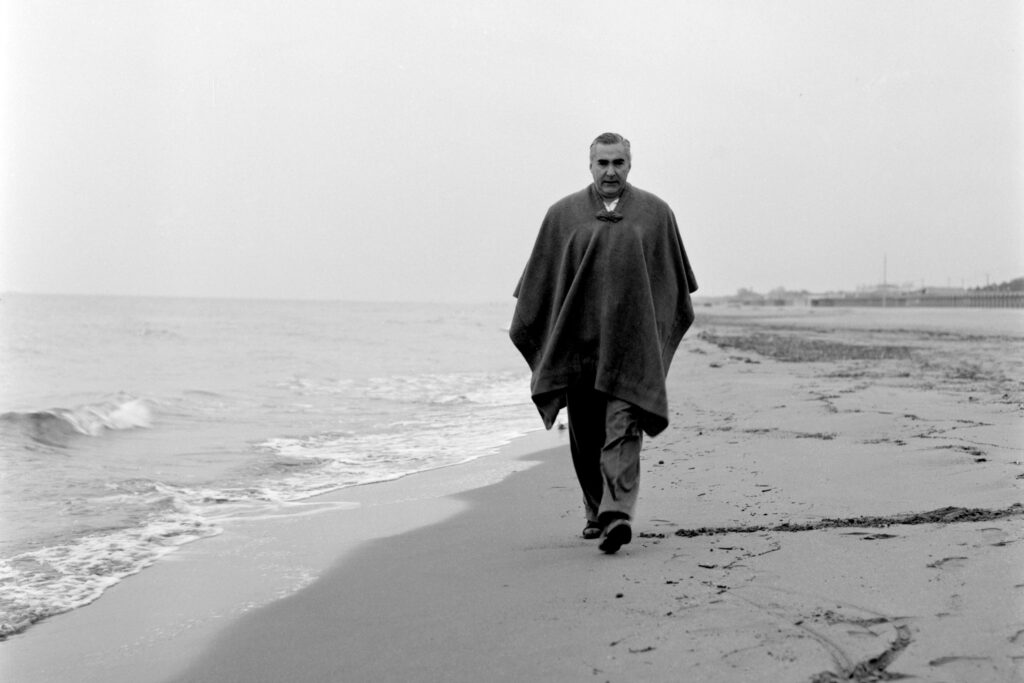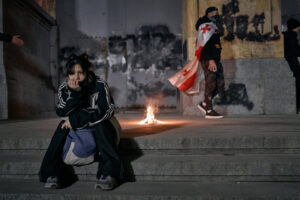Malaparte!

Curzio Malaparte’s desire to be Marcel Proust is among the few undisputed facts about this transigent literary incubus whose singular invention could be called the fictional non-fiction novel. Malaparte’s works are Proustian neither in style nor sensibility, but rather, in their author’s view, in their “keen sense of désintéressement”—evidenced by the fact “that the characters, events, and episodes… are bound by a fatality which propels them all toward one end, toward a novelistic denouement.” Therefore, Malaparte asseverates, no single protagonist appears in his novels; society itself is the subject: in The Kremlin Ball, “the USSR’s Marxist nobility” of 1929; in Kaputt, the Nazi-fascist administrative elites of Eastern Europe during wartime; in The Skin, the devastated society of Naples encountering the victorious, oblivious American armed forces.
True and false, like everything Malapartian: Malaparte the literary virtuoso is joined at the cranium to Malaparte the insufferable egoist, one hand digging deep into poisonous realities with magically addictive prose, the other sculpting the author-narrator into an aloof, often otiose gadfly buzzing around piles of human trash. Malaparte is always the protagonist, insofar as his rhetorical flights and intrusions into what he observes keep us constantly aware of his presence.
The irritating quirk percolating through Malaparte’s factitiously real-life narratives is not, per se, the exaggeration and distortion of his personal experiences or his occult materialization at monstrous events he didn’t witness, such as the Iaşi Pogrom in Romania. Whether he actually saw them or not, his depictions of such atrocities are true to the forensic reality of contemporary barbarism: mangled bodies with their heads blown off, intestines spilling from exploded stomachs, the thick stench of blood and shit and rotting flesh spreading everywhere, corpses piled into mass graves. Malaparte’s accounts are valuably graphic in ways that works of history tend to elide with quantifying euphemisms. Like Barbusse, Junger, Celine, and so many other writers of the last century, Malaparte fought in the first war to end wars (his lungs were permanently damaged by poison gas at the Battle of Bligny). He saw what modern warfare does to human bodies and minds, and exposes his readers to the obscene results—and to the artfully costumed depravity that launches the wars fought in their name. On this score, Malaparte is irreproachable, for the carnage he floodlights as well as his scabrous portraiture—at banquets, balls, golf courses, tennis courts, spas, and regally appointed government offices—of the powerful few enjoying the high life while their conscripted serfs finish up as cannon fodder, often within hearing range of the caviar buffet.
The wine sparkled in the glasses, our faces were suffused with the color of blood, eyes shone merrily, and our voices once again became warm and deep, like the voices of living people. Suddenly we heard the long wail of the alert, followed at once by the barrage of anti-aircraft guns. The mellow beelike hum of the Soviet planes came from over the sea.
“This may seem funny,” said Constantinidu in a calm voice, “but I am frightened.”
“I’m frightened too,” said de Foxa, “and it is not in the least funny.”
(Kaputt, p. 244)
Almost irreproachable. The flaws in a novel, as the novelist Claire Messud recently observed, are the flaws in the writer. Malaparte’s signature defect is an ungovernable effusion of every writer’s semi-sublimated wish: to appear exceptional and, in one way or other, slightly more important than other people. For most writers, literary achievement and a modicum of recognition can assuage at least some of their gnawing sense of nonexistence. Malaparte, on the other hand, conceived of himself as a figure, and became a writer whose works, unparalleled in so many ingenious ways, were partly contrived to confirm his importance in the world outside his narratives—worse still, his political importance.
In scenes of meticulously orchestrated hideousness that otherwise pierce the reader to the bone, Malaparte abruptly plants himself center stage, either to dramatize his superior sang-froid in a crisis or deliver an aria of interminable cogitation.
“Oui, Dieu méprise les hommes,” I said. “The Russian people are conscious of this abandonment, this solitude. Man’s greatest strength is precisely his consciousness of his abandonment, of his solitude. A man who doesn’t feel God’s contempt, his abandonment, is not a free man, but a miserable slave. In fact, the enslavement of the European people consists in precisely their conviction that God watches them, helps them, takes care of them, guides them, worries about them like a father worries about his children. Their glory and misery is caused by their belief that God forgives them and inspires them. They mix God into all their smallest matters, their business affairs, their passions, their daily well-being, their happiness and unhappiness. Without their conviction that God helps them, they wouldn’t know how to live, struggle, build, hope, be happy, despair…”
(Kremlin Ball, p. 126)
This continues for at least another few hundred words. His interlocutor—if she can be called such, as she only utters three brief sentences before Malaparte starts talking—is Madame Kameneva, Leon Trotsky’s sister, whose husband was hauled off to prison on Stalin’s orders a few days earlier. And Malaparte is lecturing her on what the Russian people are conscious of.
Malaparte lectures everybody in his books: princes, the Nazi Gauleiter of Poland, American army generals, the President of Finland, Oswald Mosley. What he says, as often as not, evinces unconventional insight, along with a scarily limitless black humor. Framing it as dialogue, especially when addressed to people with far more power than himself, betrays the high degree of surreal artifice at work, and the riskiness of presenting literary délire as documentary reality.
He was acquainted with power, intimately; after World War I he served as a press liaison at the Versailles Conference, then held diplomatic posts in Belgium and Poland; he was young, bullishly handsome, erudite, gifted with languages, and possibly the most adroit social climber of his era. Before he turned thirty he knew almost everyone bearing a title in Europe, or knew enough gossip about them to pretend he did. How he happened to travel through the exalted social realms he mined for bizarre material is no mystery. The mystery is why the character named Malaparte in his novels always delivers the sharpest lines, and usually gets the final word in every conversation, when a writer so surpassingly dexterous in other respects should certainly know when to shut up.
I spoke to her of Paris. Of the city’s gray and turquoise colors, of the autumnal pinks, the golden leaves of the marronniers, the horse chestnuts along the Seine, of the mist that rises in the evenings along the river, of the leaves crackling beneath the feet of passers-by, of the Tuileries Gardens.
“Tell me about the Place Vendôme,” Madame Lunarcharskaya said.
I spoke to her of the Place Vendôme, of the harmonious silence of the Place Vendôme, of its gray stone color, that same gray-blue of the “pietra serena,” the sandstone of Florence. I spoke to her of the Place Vendôme where there is nothing to suggest nature, no trees, grass, flowers, water, where everything is human, an entirely cerebral humanity like a Racine poem or a Cartesian idea.
….
“Tell me about Giraudoux,” Madame Lunacharskaya said.
I spoke to her of Jean Giraudoux….
(The Kremlin Ball, pp. 15–16)
And so on. During his spells of verbal overkill, other characters, including the most worldly and perspicacious—all actual persons, identified by their real names—are dumbstruck by his audacious candor, his cutting wit, his bravery, his morbid pranks, his intricate knowledge of everything from the zazous of 1940 Paris to the pleats in a Schiaparelli gown. If he had had nothing less trivial to recount, he might have become a chaste version of Henry Miller.
As a fictional character, Malaparte might be more dimensional, and more fun, if these books were written in the third person. He could still have been called Malaparte; the reader would situate him on the same plane as the other characters, and view him with the same curiosity. Witold Gombrowicz accomplished this, in more obviously fictional works, even in the first person form. But Gombrowicz was shrewd enough to make “Gombrowicz” and “Witold” far more perverse, sinister, and feckless than the author himself. Gombrowicz accepted the meaningless chaos of existence, and understood the arbitrary nature of the forms human beings impose on it—religions, social systems, moral doctrines—in the manner of spiders spinning webs.
Malaparte was a more splintered, equivocating personality. He lacked any firm convictions, but repined for certainty of some worldly or unworldly sort, a durable belief system to curtain off the void. He willed himself into one ideological stance after another, in a struggle against the intolerable recognition that he couldn’t believe in anything except the certainty of death. The tension of this conflict intermittently rescues him from rhetorical banality. His intent is more confused, and confusing, than Gombrowicz’s ever could have been. Malaparte’s infernal “I” that spills all over the place in his writing aims past a strictly literary audience, at a political constituency: before and during part of World War II, he stayed within fascist propriety while gingerly testing it, not because he opposed it per se, but because he felt uniquely exempt from the oppression of everyone else. Later, he distanced himself from any association with fascism, presenting his complicity as a highly rarefied form of opposition. In this regard, The Skin is both an indelible depiction of humanity in ruins and a self-serving, recuperative dossier aligning him with the Allied forces in Naples. He apparently thought switching sides before the war ended had a retroactive cleansing effect, and felt bitter resentment when people with long memories failed to congratulate him. Diary of a Foreigner in Paris records Malaparte’s postwar encounters with Camus and others who gave him the cold shoulder when he repaired to France in 1947, to escape the purge of fascists in Italy; he paints his transparent opportunism in valorizing colors, and impugns the good faith of anyone who wasn’t compromised. After a snub from Mauriac, he writes:
Ultimately, none of this concerns me personally. I’m a foreigner, I’ll play the foreigner. I feel weighing on my head the reproach that can be made against my country’s policies, for which I am not responsible. It’s not my fault if Mussolini declared war against France, if he behaved badly toward France. I think that certain foreigners who came to Rome before the war to pay homage to Mussolini are rather more responsible than the Italians, who had no choice.
(Diary, p. 16)
Malaparte was jailed four times between 1938 and 1943. These very brief confinements didn’t prevent him from junketing all over Nazidom as a journalist in the early years of the war, sometimes wearing an Italian military uniform. Gramsci (who wrote of Malaparte that “to achieve success he was capable of any infamy”) spent eleven years in Mussolini’s prisons, and became so ill in them that he died before his release date. It’s appalling to find passages like this in Malaparte’s postwar books:
The author remembers that during the tyranny of Mussolini and Hitler he suffered for a long time in fascist prisons—but nonetheless the experience did not induce him to make a career of being a martyr for freedom, a profession that is these days very advantageous with a guaranteed return.
(The Kremlin Ball, p. 8)
Even a week in jail feels like a long time, of course. But who can he be slagging in that last phrase? Robert Desnos? Walter Benjamin? Jacques Decour? Bruno Schulz? Irene Némirovsky? Anne Frank, possibly? Wait, no, of course: he means Mauriac, Camus, and other French resistance writers he’d met on friendlier terms in the ’30s.
It’s possible that Malaparte was unwontedly snared into politics when his first book, Viva Caporetto! (later retitled The Revolt of the Cursed Saints) appeared in 1921. (Malaparte was not yet Malaparte, but published it under his original name, Kurt Erich Suckert.) Viva Caporetto! is a book-length pamphlet defending the Italian soldiers who mutinied after a chlorine-arsenic attack during the Battle of Caporetto. They knew their gas masks, shoddily manufactured by war profiteers, would only protect them for two hours, and sensibly fled. Suckert/Malaparte heaps execration on the army leadership for its treatment of infantry soldiers; on corrupt, indifferent civilians; on incompetent political elites. As William Hope writes in his incisive Curzio Malaparte: The Narrative Contract Strained, Viva Caporetto!’s “main thrust was a radically new interpretation of the Caporetto revolt as a proletarian uprising against social injustice, a thesis that was bound to alienate the patriotism of bourgeois, civilian readers.” In fact, it alienated everybody. Windows of bookshops displaying it were smashed. The book was confiscated by Liberal government ministers and, in an unusual display of unanimity, also attacked by the right-wing press.
Neither Malaparte’s war experience nor the reception of his first book instilled any pacifistic sentiments. Malaparte was spellbound by violence—he reputedly fought sixteen duels over a thirty-year period—as an expression of masculinity, a lever for social disruption, an immutable fact of human life, or simply relief from boredom. In his personal life, when he had one, he seems to have been a relatively easy person to get along with, reclusive and bookish; perhaps he simply understood that war, bloodshed, and degradation were literary gold, and posing as a stolid political swami was a great way to get publicity.
He later lied about marching on Rome with Mussolini’s mob in 1922, but he really did support Il Duce after the murder of Matteotti, leader of the Socialist Party, in 1924. He barely knew Mussolini, who supposedly detested him, but sometimes claimed to be one of the dictator’s close advisors. Malaparte did have social connections to Galeazzo Ciano, Mussolini’s son-in-law; Ciano was an authentic Count, and part of the beau monde Malaparte felt comfortable in.
Malaparte remained a mercurial, unenthusiastic Fascist Party member through the ’20s, producing novels, poems, and stories imbued with the pastoral lyricism of the anti-urban, back-to-the-farm Strapaese wing of the fascist movement, at the same time publishing articles and editing journals supporting the opposite, pro-industrializing faction. He took himself seriously, but little else.
The Matteotti affair, which could have ended Mussolini’s political existence but instead tightened his grip on power, has a legible connection to The Kremlin Ball. The Liberal senator Alfredo Frassati had been owner and editor of La Stampa, the Turinese daily newspaper and one of Italy’s oldest, since 1895. After publishing investigative reports on Matteotti’s assassination, Frassati was pressured to sell the paper to Giovanni Agnelli, the Fiat magnate, who “fascisized” La Stampa as per Mussolini’s ukase (or fiat, if you like). In February, 1929, Agnelli appointed Malaparte, who fiercely lobbied for the job, as editorial director of the newspaper.
A mere three months later, Malaparte travelled to Moscow as a correspondent, and began filing articles on the state of things in the USSR. (He may also have been furthering Agnelli’s business interests in Russia.) The Kremlin Ball, written in fits and starts between 1948 and 1950, recounts Malaparte’s experiences during this visit. Thanks to Maurizio Serra’s 2011 biography, we now know that Malaparte stayed only a month in Moscow, in May-June 1929. His dispatches ran at widely-spaced intervals in La Stampa, however, creating the illusion that Malaparte remained in Russia, or returned there regularly, until late December. He had a squidlike instinct to cloud his movements. It helped turn his life into fiction.
What a fertile month it must have been: Malaparte squeezed two books from it: Intelligenzia di Lenin (1930), a collection of his La Stampa articles, and Le Bonhomme Lénin (1932), a badly sourced, deflationary biography: entertaining, spirited, and utterly specious. It became popular for a time.
Between these Lenin volumes, Malaparte published Coup d’Etat: The Technique of Revolution, which became an international best-seller. A repetitive, lucid tract, it lays out the formula for successful insurrections (“capture of all strategic points in the town and province…the vital centers of technical organization—gas and electricity works, general Post Offices, telephone and telegraph exchanges, bridges, railway stations.”). Given the instability of the times and the book’s chapter subjects (“Trotsky vs. Stalin,” “Primo de Rivera and Pilsudski,” “Mussolini,” etc.) its success was predictable. As in his Lenin biography, Malaparte credits Trotsky’s tactical skills with the success of the October Revolution, disparaging Lenin as an ineffectual, bourgeois strategist. The chapter on Mussolini describes the cultural propaganda surrounding him as “the summit of bad taste,” while Mussolini himself is examined with cautious but less than adoring scrutiny.
In this period of foreseeable entente between Fascist Italy and the ascendent German Nazis, titling the final chapter “A Woman: Hitler,” was a fraught provocation. Malaparte writes that Adolf H. “is a weak man who takes shelter in violence, so that he may conceal his lack of energy, his unexpected failings, his morbid egoism, and his clumsy pride … There is something confused, equivocal, something morbidly sexual in Hitler’s opportunistic tactics … and in his hatred of every form of individual freedom and dignity.”
Calling Hitler a woman was a supreme insult to fascist machismo, a mindset Malaparte shared to an extent, along with its homophobia and anti-Semitism. Malaparte doesn’t entirely dehumanize the victims of fascism in his novels. By his own lights, he treats them sympathetically. His lights are none too bright, however, and the objects of his sympathy conform to derisive stereotypes. He means no harm to the brutalized people he sees, but hasn’t the faintest idea how they see him, strutting about with their murderers. It is somehow more appalling that so many of the horrors Malaparte depicts are his own invention, and invented solely to show himself in a flattering light. His visit to the Warsaw ghetto in Kaputt—one of numerous hideous fictions debunked over time—is an outstanding example of Malaparte’s cavalier use of other people’s suffering to burnish his image. Another is a strategically placed, adventitious scene in Diary of a Foreigner in Paris where Malaparte rescues a Jew who collapsed in the street while indifferent Parisians promenade around him.
Malaparte’s relationship with Agnelli went south, as his editorship of La Stampa, as William Hope puts it, “was decidedly unorthodox,” particularly in the newspaper’s “extensive coverage… given to the strikes and industrial unrest which swept across France and Belgium in the aftermath of the Wall Street Crash.” Agnelli fired him in 1931. (Two years later, Malaparte commenced a long affair with Virginia Bourbon del Monte, the wife of Agnelli’s son Edoardo; after Edoardo’s plane crash death in 1935, the lovers planned to marry, but the Agnelli family threatened to take Virginia’s seven children away if they did.)
Counter to Malaparte’s version of things, it’s unlikely that his expulsion from the Fascist Party in 1933, and his sentencing to five years of exile on the island of Lipari, had much to do with the publication of Coup d’Etat. It’s probable that Mussolini never read it, though Malaparte avowed that the dictator kept an open copy on his desk with several passages thickly underlined. He also put it about that Hitler himself, enraged by the book, had demanded the author be thrown into prison.
The prevailing consensus is that Malaparte was banished for defaming Italo Balbo, Italy’s Air Minister, on the basis of a private letter Malaparte sent from Paris to Nello Quilici, the editor of Corriere Padano, a publication Balbo happened to own. The Balbo contretemps has remained a murky business ever since it happened. Balbo’s biography refers twice to Malaparte as Balbo’s friend, and later mentions the letter to Quilici, but says nothing about the defamation charge, or Malaparte’s exile. Purportedly, Malaparte accused Balbo of corruption, which was probably true, and also insinuated that Italy’s beloved aviator (who later died in Libya, when his plane was mistaken for a British bomber and shot down by his own anti-aircraft squad), was plotting a coup to depose Mussolini. That probably wasn’t true.
After a year on sulfurous, volcanic Lipari, through his ties with Count Ciano, Malaparte was allowed to move to more resort-like Ischia, then to even plushier Forte de Marmi in Tuscany, conveniently near Villa Agnelli, where his paramour lived.
I would love to just skip World War II, except to note that after a brief remobilization to the Alpine Franco-Italian front, Malaparte moved about freely in Axis-occupied Eastern Europe as a journalist, though he frequently did so while wearing his Italian officer’s uniform. (It’s improbable that he would have been given this unusual liberty if Hitler had ever heard of Coup d’Etat.) Malaparte reported from the German army’s battle lines in Ukraine, Russia, Romania, Belorussia; he spent time away from the front in Poland, Croatia, Finland, and Norway, hobnobbing with the upper crud of the Master Race. The bulk of his frontline reporting, which contains some of Malaparte’s most sensitive writing and strikes no fictional-sounding notes, is collected in The Volga Rises in Europe. Much of what he didn’t report—mass killings of Jews, arbitrary executions of Russian civilians, a basket of human eyes delivered to Ante Pavelic, the Croatian dictator—found its way into Kaputt.
In an afterword to the NYRB edition of Kaputt, Dan Hofstadter reports that Lino Pellegrini, a young journalist who was Malaparte’s driver during his wartime travels, “recalled that the first part of Kaputt was originally drafted with the conviction that Hitler would win the war… Later, seeing how the wind was blowing, Malaparte rewrote the manuscript.”
This should be appalling, probably, but the quiddity of Malaparte is such that it also seems hilarious, consistent with the absence of moral inflection that gives Malaparte’s work its macabre comedic drift. For despite the dire, desperate, atrocious situations Malaparte conjures up in his books, his narrative poker face, his unexcited stare at things that should be unbelievable but really aren’t at all, transmit a repulsive but irresistible sense of cosmic absurdity. Pellegrini’s disclosure unravels Malaparte’s dramatic introduction to Kaputt, “The History of a Manuscript,” the exciting saga of a secretly written exposé of Nazi insanity, parts of it dispersed across Europe via diplomatic confederates, some chapters sewn into the lining of the author’s coat by a Russian peasant girl, its final chapters secreted in the double soles of his shoes. This tale is diverting as a straight preface, but finding out it’s bullshit raises it almost to the level of genius.


